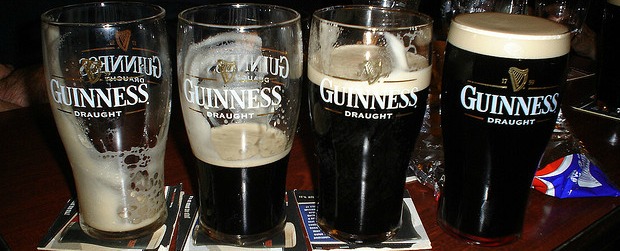You have no items in your cart. Want to get some nice things?
Go shopping
We met every Thursday, around eight. Joe always arrived first, a muddy work boot on the footrail beneath the bar, an elbow on the wooden counter.
True to form, he was there when I walked in. “Just in time,” he said, smacking me on the back before making his way to the table by the fire. He’d have been standing there a good ten minutes, chatting up the barmaid and claiming the thirst hadn’t hit him yet.
The girl behind the bar was new. Probably one of Donal’s nieces, they grew up so fast. Dark hair, look of mischief in the eyes. Reminded me of someone. She selected a proper branded glass for the Guinness, angled it perfectly for the pour, stopped the tap before the final stretch to let it stand. A man could settle down with a woman like that.
“I’ll bring them over,” she said, handing me the change.
“Right-o,” I said, avoiding her eyes.
Joe’s fiddle was already out of its case and lying on the table. “I suppose Peter isn’t coming?” he said, scratching his beard.
“No. Daughter’s in hospital again.”
“Poor bastard.”
“It’s operable, so he said.” It was hard to make it sound optimistic. He’d had an awful run of bad luck, the poor fella. We’d miss him bashing the hell out of the bodhran, driving us forward, but he had more important things to worry about than keeping us in time.
The barmaid brought the pints. “Now,” she said, bending down to place them gently on the table.
“Will you look at that: perfect,” said Joe, staring where he shouldn’t be. “Perfect now.”
She didn’t seem to notice. Occupational hazard. Plus she’d be the sober one come closing time, looking at the shower of eejits in the corner.
“Ahhhh… that’s taken the edge off.” Half of Joe’s pint was gone before I’d barely picked up my glass. He’d make the other half last though, until those pub doors swung open again.
“That’s a one, isn’t it?” he said, nodding to the bar. “Studying to be a teacher. Could teach her a few lessons.”
“Keep your voice down -”
“Ah, she loves it. Loves it, she does.”
“You don’t even know her.”
“Sure amn’t I after talking to her for the past twenty minutes, waiting for you to turn up and put your hand in your pocket for once? Ah now – look who it isn’t.”
“What’ll it be, fellas?” It was Martin with his battered old flute case. Joe quickly downed the rest of his pint.
“Not for me, Martin,” I said.
“Just one for the big man, so.” He made his way to the counter. Martin taught chemistry at the local college. He’d have won the egg-and-spoon race at the sports day, only he’d taken a dive at the last moment so Miss Byrne from Drama could sail through the tape. Liz was her name; they’d been enjoying a bit of mild flirting in the staffroom. News travelled fast in a small town.
“What are you waiting for? A spotlight?” said Joe to me. “Our audience awaits.”
He swept his hand across the room, taking in the three souls apart from us: Old McCarthy sitting at the end of the bar, head bowed to his whiskey glass, possibly asleep; and a middle-aged couple sitting straight-backed by the far window in matching wind-cheaters. Hill walkers they were, aka The Lesser-Spotted Tourist, not seen much round these parts since the arse fell out of the economy.
It was hardly Croke Park we were playing to, but that wasn’t the point. You didn’t play an Irish session for other people; you played it for yourself, for the hell of it.
“Here we are now,” said Martin with the pints.
“Having a nice chat over there, were you?” said Joe. “She’d have brought the pints over.”
“Ah sure there’s no harm in being sociable,” said Martin.
“How’s the missus?” said Joe with a wink.
“At home with the kids. How’s yours?”
Helen had left Joe twelve months back; nobody quite knew why. Probably for his being an annoying old bollix.
“All right, all right,” said Joe. “There’s no need for any Drama… not outside school hours anyway, wha?” He picked up his pint.
Martin was about to say something but stopped himself. He clicked open his case and took out the flute.
I opened my own case. I’d had the guitar since I was fifteen, back when I saw it as my passport out of here. It was funny if you thought about it long enough.
“Oh, here he comes,” said Joe, nodding to the door and reaching for his pint.
“Brendan,” I said.
“Fellas. Same again?” He slipped off his jacket. Real Italian leather; he’d shown me the silk lining at the football.
“Ah sure I could squeeze another one in,” said Joe, placing a half-empty glass on the table. “Where’s the accordion?”
Brendan froze. “Ah sure haven’t I left it in the back of the Jag,” he said, shaking his head slowly. “I’ll get it in a minute.”
He nodded to the barmaid. She nodded back. Brendan was the kind of man who didn’t need to approach the bar. He was all right, Brendan, despite the money and him being my boss and everything. Owned three hotels within twenty miles, had women chasing him every which way. Hence the two divorces.
“So, shall we play this anyways or what?” said Martin, slapping his hands together. “Go out there Brendan and bring that old squeezebox in.”
“How about the Listowel Set?” I said.
“Sure why do we always start with a fast one?” said Joe. “Whatever happened to warming up?”
“You’re warmed up enough,” said Martin, pointing to the empty glasses.
When Brendan returned he started us off with a few silky notes on the accordion and we all jumped on the wagon. We always stuck to the upbeat tunes – the jigs and the reels; none of those sad songs the old fellas sing.
Joe, contrary to behaviour, was an excellent fiddle player. It was as though he forgot who he was when he played. By halfway through the first jig, he was leading the melody like a wise old Sherpa, guiding us through the landscape of the tune, adding grace notes here and there that caught us by surprise and made us smile with the sheer joy of it.
Martin was a demon on the flute, the notes flowing like a freshwater stream through your ears. Maybe that’s what enchanted the fragrant Miss Byrne from Drama. I could picture Martin playing for her, him sitting on the edge of the assembly hall stage perhaps, legs dangling over the edge, her trying to look casual on a grey plastic chair.
I envied Martin his lovely wife, his family, his house, his bit of female attention. And sure what had I? Knocking around my late father’s cottage like a snooker ball that can’t find a pocket.
I looked over at Brendan: his fingers were skipping over the accordion keys, washing the sound with colour. He had a serene look on his face that you couldn’t buy with money.
As for me, I was just trying to keep up. My rhythm guitar was the backbone now that Peter’s bodhran wasn’t here to keep us in line. Sure I wasn’t a great player at all. I was workmanlike, much the same as when doing odd jobs for Brendan in the hotels. Jack of all trades. Master of nothing.
Connor had been the talented one, the school friend I’d played songs with years ago – a real acoustic duo – before he left for London on his own, with just a guitar on his back and the address of a cousin in his pocket. I often wondered where he’d ended up. Far from here, anyways.
After a few minutes we were in full flow and began to lose ourselves. To the naked eye we were just four fellas sitting around a table, but the naked eye can play tricks. We were magicking ourselves out of this town through the music, galloping away over the hills, the wind at our backs, pushing ourselves out of our skins, further and further until, slowly, the gentle but insistent pull of the melody coaxed us back to the beginning again, to home, like a baby placed gently back in its cradle.
No wonder we came here every Thursday.
After near enough two hours of playing we stopped, exhausted. We were about to pack up when Old McCarthy cleared his throat and began singing from the other end of the bar.
“Black is the colour of my true love’s hair.
Her lips are like some roses fair…”
“Ah jaysus not this auld song,” said Joe.
“Leave him now,” said Brendan.
“She has the sweetest smile and the gentlest hands
And I love the ground whereon she stands…”
McCarthy’s voice had started off shaky but grew more determined with every word.
“I go to the Clyde and I mourn and weep
For satisfied I ne’er can be…”
We sat there, trying not to listen to the words. McCarthy stared at his empty glass as he sang, as if the face of his Maggie would appear at the bottom.
“I write her a letter, just a few short lines
And suffer death a thousand times…”
When he reached the end of the song, he closed his mouth and continued to stare at the glass.
“Good man yourself,” said Brendan.
I drained the last of my Guinness. No one was in the mood for any more talk.
“I’ll be off, so,” said Martin.
“Right enough,” said Brendan.
In the car park we went our separate ways. I opened the car door and placed the guitar case on the passenger seat. Some company that was. I wished the lads had piled into the back. We would go to mine, light the fire, open a new bottle, play until dawn. Cheating the darkness.
Connor was the lucky one all right. I was supposed to go with him, to London, but I got cold feet at the last minute, didn’t turn up for the ferry.
It’s surprising how slowly a boat leaves a dock. It just creeps forward, bit by bit, as if waiting for someone who is late to just leap on: come on, hurry, you can still make it…
I’d watched immobile from the cliffs, observing the future pulling slowly away, just as I’d watched a coach rolling out of the bus station a few years later, a dark-haired woman crying on the back seat.
The lamps inside the pub were going off one by one. McCarthy stood in the doorway, hopeful for a lift back to his lodgings.
“Come on, so,” I said.
We drove in silence, except for me asking if he wanted to come in for a nip of brandy as we approached the cottage. He nodded his head. Sure I couldn’t open the bottle alone.

About Bernie Deehan
Bernie Deehan's short stories have been published in Vintage Script and .Cent, and performed by actors at live fiction event Liars' League. As well as short fiction, he writes a blog and is adapting his story 'Listen' into a novel.




